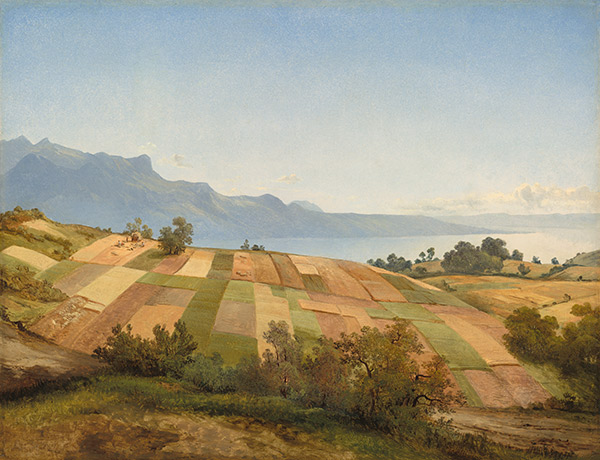Subtotal: $
Checkout
The Plough Music Series is a regular selection of music intended to lift the heart to God. It is not a playlist of background music: each installment focuses on a single piece worth pausing to enjoy.
Summer, wrote Gerard Manley Hopkins, is “barbarous in beauty.” Inspired by similar feelings, Beethoven wrote his sixth symphony, the “Pastoral,” which describes a summer day spent in the country. The loveliness of this music is as familiar as that of a summer day and no less worth stopping to take time to contemplate.
Beethoven loved nature and often walked in the countryside, stopping to write down ideas on the sheets of music paper he kept folded in his pocket. “How glad I am to be able to roam in wood and thicket, among the trees and flowers and rocks. No one can love the country as I do. My bad hearing does not trouble me here. In the country every tree seems to speak to me, saying, ‘Holy! Holy!’ In the woods there is enchantment which expresses all things!” To Therese, his “immortal beloved,” he wrote, “Do not forests, trees, rocks re-echo that for which humankind longs?”

Alexandre Calame, Swiss Landscape
In one of his conversational notebooks – his means of communication after his deafness made conversation impossible – he records this from an exchange with a friend:
Here, surrounded by the products of nature, often I sit for hours, while my senses feast upon the spectacle of nature. Here the majestic sun is not concealed by any dirty roof made by human hands, here the blue sky is my sublime roof. When in the evening I contemplate the sky in wonder and the host of luminous bodies continually revolving within their orbits, suns or earths by name, then my spirit rises beyond these constellations so many millions of miles away to the primeval source from which all creation flows and from which new creations shall flow eternally.
When, now and again, I endeavor to formulate my seething emotions in music – oh, then I find that I am terribly deceived; I throw my scrawled paper upon the ground and feel firmly convinced that never shall anyone born on this earth be able to express in sounds, words, colors, or stone those heavenly images that hover before his excited imagination in his happiest hours... Yes, it must come from above, that which strikes the heart; otherwise it's nothing but notes, body without spirit, isn't that so? What is body without spirit? Earth or muck, isn’t it?
The spirit must rise from the earth, in which for a time the divine spark is confined, and much like the field to which the ploughman entrusts precious seed, it must flower and bear many fruits, and, thus multiplied, rise again towards the source from which it has flown. For only by persistent toil of the faculties granted to them do created things revere the creator of infinite nature.
“He who has ever had a notion of country life,” Beethoven wrote of the Pastoral Symphony, “can imagine without too many descriptive words what the composer has intended.” The first four movements depict the joys of a country walk, a country dance, the drama of a summer storm. Beethoven’s unconventional heading for the fifth and final movement is: “Shepherds’ song. Happy and thankful feelings after the storm.” In brief program notes Beethoven wrote that the final movement should evoke “salutary feelings combined with thanks to the Deity,” and the music concludes with a reflective and prayerful episode (8:17) which leads into the closing chords. According to critic Phillip Huscher:
The clouds finally roll away, the oboe promises better things to come in a wonderfully heartfelt phrase, and the flute, with its staccato scale, raises the curtain on Elysium. And so, to the yodeling of the clarinet and horn, we willingly believe F major to be the most beautiful key on earth.
This splendid performance by the Chicago Symphony Orchestra was conducted by Sir Georg Solti.
Already a subscriber? Sign in
Try 3 months of unlimited access. Start your FREE TRIAL today. Cancel anytime.







Patrick
Obviously I haven't read nearly enough from Beethoven. This makes the joy of this symphony even greater.. thank you !
Gillian Grace
To imagine Beethoven, away from the constraints of his disability, revelling in God's creation and his soul soaring to new heights is delightful. Listening to his sublime symphony anew in view of this homage. Thank you Plough and thank you Colin Fields. Have just read other comments and am smiling... We three using same adjectives... sublime and delightful.
Megs Singer
THANK you for sharing this beauty and a reminder to praise God in beauties we can find outdoors. Music is sublime!! A needed respite from all that's wrong with the world right now.
Stewart Patrick
Thank you for this delightful insight to Beethoven's faith and this Symphony. It means so much more with that understanding.